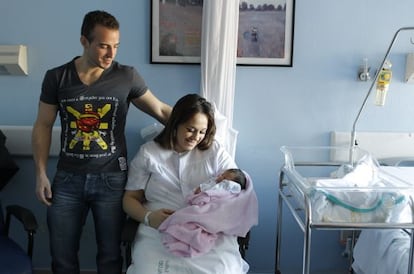Babies picked to be life-saving donors born in Seville and Barcelona
Infants' embryos were selected to help cure their seriously ill siblings

The birth of two babies in Seville and Barcelona has breathed life into the issue of genetically selecting embryos to help cure siblings with serious diseases. Since the technique was legalized in Spain in 2006, only one other similar case had been known about - at the Virgen del Rocío public hospital in Seville in 2009 - which produced a poor outcome.
But on Monday the same hospital announced the birth of Estrella, conceived to save the life of her brother Antonio, who was diagnosed three years ago with severe bone marrow aplasia. This serious illness affects bone marrow functioning in such a way that not enough white blood cells, red blood cells and platelets are produced and sufferers need regular blood transfusions. Antonio, who lives with his parents in Churriana de la Vega (Granada), undergoes these every Thursday.
The only treatment is a transplant of bone marrow or umbilical cord cells from a compatible donor, of which none were available for Antonio. Hence his parents' recourse to embryo selection, a complicated procedure in which the probability of conceiving a donor baby is less than 10 percent. It consists of an assisted reproduction treatment in which embryos fertilized in vitro are subjected to a three-stage selection process. As well as being viable, the embryos must be free of their siblings' illness and have the same histocompatibility to avoid rejection of the transplant.
Estrella was born on Saturday. "Now we are waiting to see if the transplant is successful," said Guillermo Antiñolo, director of the Clinical Management Unit of Genetics, Reproduction and Fetal Medicine. At the moment, no date has been set for the surgery.
A few hours after the Seville case was made public, the Valencian Infertility Institute (IVI) announced the birth, 11 months ago, of twins Noah and Leire, whose embryos were selected to help their brother Izan, who is affected by a rare neurological disease, adrenoleukodystrophy. Bone marrow and umbilical cord cells from one of the twins were transplanted into Izan on October 28 but doctors want to wait six months to determine if the transplant has been a success, said Isabel Badell, head of the children's transplant unit at Barcelona's Sant Pau hospital. For the moment, though, things were going well, she said.
Since 2006, the Health Ministry has received 67 applications for the embryo selection procedure, of which 31 were given a positive reply. From those, however, only three compatible babies - the one in Seville and the twins in Barcelona - have been born.
Tu suscripción se está usando en otro dispositivo
¿Quieres añadir otro usuario a tu suscripción?
Si continúas leyendo en este dispositivo, no se podrá leer en el otro.
FlechaTu suscripción se está usando en otro dispositivo y solo puedes acceder a EL PAÍS desde un dispositivo a la vez.
Si quieres compartir tu cuenta, cambia tu suscripción a la modalidad Premium, así podrás añadir otro usuario. Cada uno accederá con su propia cuenta de email, lo que os permitirá personalizar vuestra experiencia en EL PAÍS.
¿Tienes una suscripción de empresa? Accede aquí para contratar más cuentas.
En el caso de no saber quién está usando tu cuenta, te recomendamos cambiar tu contraseña aquí.
Si decides continuar compartiendo tu cuenta, este mensaje se mostrará en tu dispositivo y en el de la otra persona que está usando tu cuenta de forma indefinida, afectando a tu experiencia de lectura. Puedes consultar aquí los términos y condiciones de la suscripción digital.








































